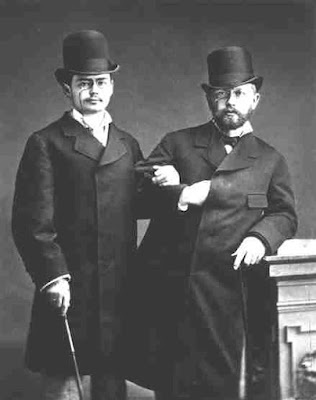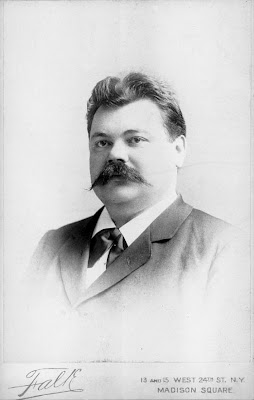Iosif Kotek & Tchaikovsky, 1877
Concierto para violín en Re mayor, Op. 35, Pyotr Ilyich Tchaikovsky, un concierto con una historia bastante azarosa en busca de interprete y con varias dedicatorias
Tchaikovsky quiso dedicar este concierto a Iosif Kotek, pero se vio constreñido por las indudables habladurías que se producirían entorno a su relación con el joven. (Ellos eran, con casi total certeza, amantes y Tchaikovsky se pasaba la vida disimulando su homosexualidad ante el público. En 1881, rompe con Kotek tras haber este rechazado interpretar el concierto al creer que sería mal recibido y dañaría su incipiente carrera.)
Leopold Auer, 1890
Tchaikovsky en principio había previsto que esta obra hubiera sido dedicada y estrenada por Leopold Auer, para quien había escrito la Serenata melancólica para violín y orquesta. Auer se negó, con lo que el estreno previsto para Marzo de 1879 fue cancelado y empezó la búsqueda de un nuevo solista. En 1912, Auer esplicaría su versión de los hecho en el "New York Magazine Musical Courier":
"When Tchaikovsky came to me one evening, about thirty years ago, and presented me with a roll of music, great was my astonishment on finding this proved to be the Violin Concerto, dedicated to me, completed and already in print. My first feeling was one of gratitude for this proof of his sympathy toward me, which honored me as an artist. On closer acquaintance with the composition, I regretted that the great composer had not shown it to me before committing it to print. Much unpleasantness might then have been spared us both....
Warmly as I had championed the symphonic works of the young composer (who was at that time not universally recognized), I could not feel the same enthusiasm for the Violin Concerto, with the exception of the first movement; still less could I place it on the same level as his purely orchestral compositions. I am still of the same opinion. My delay in bringing the concerto before the public was partly due to this doubt in my mind as to its intrinsic worth, and partly that I would have found it necessary, for purely technical reasons, to make some slight alterations in the passages of the solo part. This delicate and difficult task I subsequently undertook, and re-edited the violin solo part, and it is this edition which has been played by me, and also by my pupils, up to the present day. It is incorrect to state that I had declared the concerto in its original form unplayable. What I did say was that some of the passages were not suited to the character of the instrument, and that, however perfectly rendered, they would not sound as well as the composer had imagined. From this purely aesthetic point of view only I found some of it impracticable, and for this reason I re-edited the solo part.
Tchaikovsky, hurt at my delay in playing the concerto in public and quite rightly too (I have often deeply regretted it, and before his death received absolution from him), now proceeded to have a second edition published, and dedicated the concerto this time to Adolf Brodsky, who brought it out in Vienna, where it met with much adverse criticism, especially from Hanslick. The only explanation I can give of the orchestral score still bearing my name is that when the original publisher, Jurgenson, of Moscow, to suit the composer, republished the concerto, he brought out the piano score in the new edition, but waited to republish the orchestral score until the first edition of the it should be exhausted. This is the only way I can solve the problem of the double dedication.
... The concerto has made its way in the world, and after all, that is the most important thing. It is impossible to please everybody."
Leopold Auer para Musical Courier, 12 de Enero de, 1912
Adolph Brodsky, entre 1891-94
Al final la obra se estrenó, interpretada por Adolph Brodsky, en Viena el 4 de Diciembre de 1881, siendo el director Hans Richter. Obviamente la dedicatoria volvió a cambiar, siendo su destinatario Brodsky. Entre la crítica hubo reacciones de todo tipo, pero agua pasada no mueve molino.
Karel Halíř, 1890
Lo que sí es relevante es el hecho de que en 1888 Tchaikovsky asiste en Leipzig a la interpretación de su obra en la que el solista es el violinista es Karel Halíř, Tchaikovsky afirmara que fue "un día memorable", al final tras muchas vueltas la obra había encontrado a su interprete.
Previamente:
Bajo el Signo de Libra: Tchaikovsky, último acto
Bajo el Signo de Libra: "Sinfonía nº 1 en sol menor, Op. 13" Pyotr Ilyich Tchaikovsky
Bajo el Signo de Libra: "Variaciones sobre un tema rococó opus 33" de Tchaikovsky



4 comentarios:
Me encanta esta obra. Creo que, entre las mejores interpretaciones que pueden escucharse, está la de David Oistrakh con dirección de Eugene Ormandy. Es genial!
Es una gozada, P-Jota.
Lo he escuchado en más de una ocasión en vivo y en directo. A mí la interpretación que más me ha gustado fue una de Itzhak Perlman.
Creo que en el Palau.
No conocía la anécdota.
y yo que cada día tengo más difusas las marcas de homo y heterosexualidad... Yo tampoco conocía esta historia. Tchaikovsky siempre es regusto.
Publicar un comentario